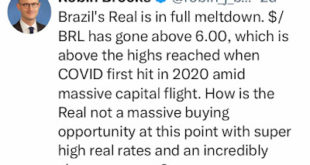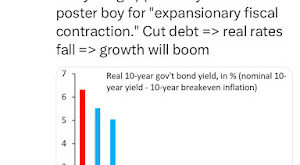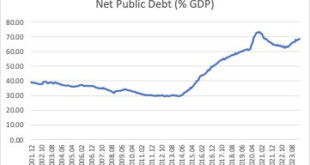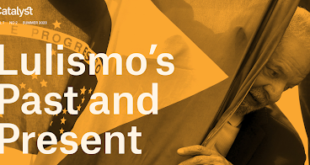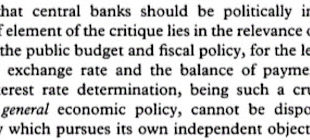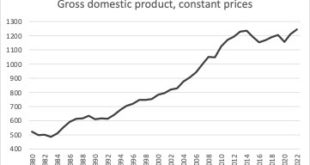By Nathalie Marins, Ricardo Summa & Daniel Consul (Guest bloggers)Currency devaluations can disrupt developing economies by raising import costs and food prices, which in turn reduces real wages. This impact is particularly detrimental to lower-income households, which typically allocate a substantial portion of their income to essential goods. Consequently, when the local currency weakens, governments encounter increased political pressure due to rising prices that erode purchasing...
Read More »Serrano, Summa and Marins on Inflation, and Monetary Policy
[embedded content] This is the full round table on Inflation and Monetary Policy organized by the Bucknell Institute for Public Policy (BIPP), with Franklin Serrano, Ricardo Summa and Nathalie Marins.
Read More »Very brief note on the Brazilian real and the fiscal package
The Brazilian real depreciated last week (full meltdown might be a bit of a hyperbole), and in many quarters there has been a suggestion that it is now undervalued, and that would somehow be connected to the dangers associated with the fiscal position, and the willingness of the Lula government to push the spending cuts, and the tax changes, with cuts for those at the bottom of the income distribution and hikes at the other end (more on the fiscal story in a bit).The obvious reason for this...
Read More »30 years of the Real Plan: Unoriginal Lessons from Latin American Stabilizations
Original thoughts The 30 year anniversary of the stabilization plan that controlled high inflation in Brazil, the so-called Real Plan, just passed earlier in July. I wanted to write something about it, but it got buried with other things. Here just some very short reflections. There was a huge coverage in the media and several new books and papers written about it, including by several of the actual participants of the stabilization plan. If I have to leave one impression beyond the...
Read More »Brief note on public debt and interest rates in Brazil
Robin Brooks, previously the chief economist at from the Institute of International Finance (IFF), and now at Brookings, suggests Brazil needs austerity, and, here is the punch line, that would promote growth (laugh track here).The notion that it is the fiscal balances that determine the interest rate on public debt, and that fiscal deficits and high debt must imply high interest rates has no correlation with reality. Imagine the rate of interest that Japan would have if that was correct. In...
Read More »Lula’s fiscal problems
Almost everything that’s wrong with conventional views on fiscal policy is on display in this column (well written and clear) by one of the key journalists from Folha de São Paulo, Vinicius Torres Freire. He suggests that the current fiscal adjustment is not credible. For him, this is a confidence crisis, caused by Lula’s insistence on attacking the central bank policy and his lukewarm support for the adjustment. Why the adjustment is necessary, he never asks. It’s evident, for any educated...
Read More »Lulismo’s Past and Present
Lula da Silva’s return to the presidency in Brazil has opened up the possibility of deepening democracy and expanding the scope of egalitarian advance for the Brazilian working class. In what ways might his administration pursue expansionary fiscal and redistributive policies that would improve the conditions of his political base?In the latest print issue of Catalyst, Matías Vernengo explores the historical and contemporary contours of Brazil’s political economy and outlines how the Lula...
Read More »On central bank independence, and Brazilian monetary policy
The issue is back in the news. This time in Brazil (it was briefly an issue here when Trump did not reappoint Yellen, and then complained about Powell's interest rate where too high). At any rate, I always thought that there were good reasons for skepticism about central bank independence (CBI). As noted by Massimo Pivetti in this old piece on the Maastricht Accord and the, at that time, plan for the euro, the main reason to be doubtful is related to the interaction of monetary policy and...
Read More »What is happening in Brazil
I googled [what the hell is happening in Brazil] and the only ones of the firsts 10 hits on the election are on how the military found no evidence of fraud. (your googling will vary as google shows me what it expects me to click and now knows much more about me than I do). It is very alarming and sad that the military has expressed an opinioni on a matter which is none of their business (I don’t blame the generals, I think they had to, see...
Read More »Lula’s election and what lies ahead
It's been a while since I wrote about the Brazilian crisis (a summary of the previous catastrophic election here). In part that election and the continued crisis explains why I have written less, not just about Brazil. This has been a long economic depression that started in 2015 (see graph), with a coup in 2016 and since 2018 the added problem of a right-wing authoritarian regime that won an election that was only possible with the political proscription of Lula. But at least the political...
Read More » Heterodox
Heterodox

